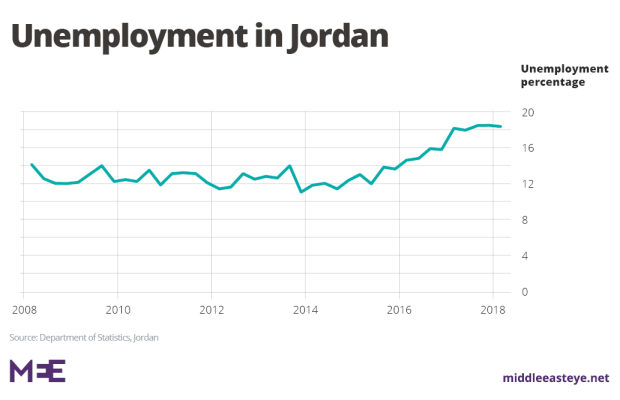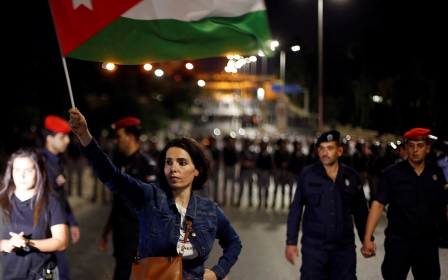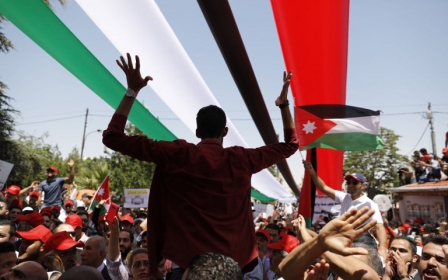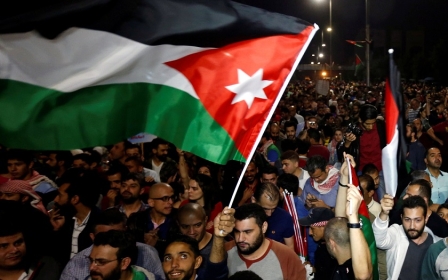Is the Arab Spring still alive in Jordan?
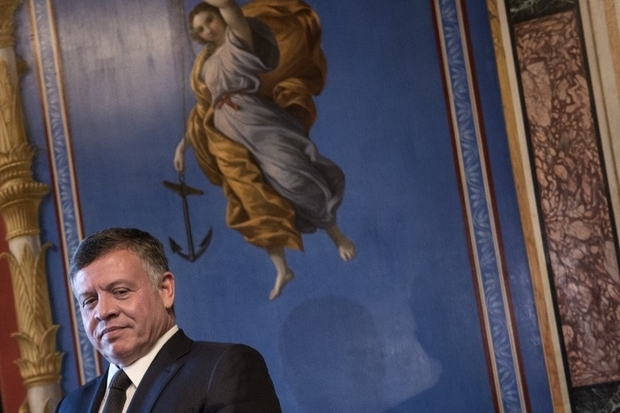
The voices from Jordan should make everyone sit up and listen.
"We the people are the source of authority and we want to reclaim our ability to make change in the presence of weak institutions like the parliament or political parties," said Hala Ahed, a lawyer.
Or Deema Kharabsheh, who had been demonstrating outside the prime minister’s office: "People brought down the government. It didn’t resign voluntarily."
Or indeed this man: “I learned from my father to be with my sons and daughters, the citizens of Jordan.”
The last quote came from King Abdullah II.
If this sounds like a re-run of the Arab Uprising in 2011, it isn’t. It is bigger than that, or the protests in 1989 and 1996. In both years, protests were driven by tribes in rural governorates.
This is the first mass protest in the kingdom’s modern history, with 46 different demonstrations in cities all over the country. The national strike was truly a national event.
I learned from my father to be with my sons and daughters, the citizens of Jordan
- King Abdullah II
This isn’t just what happens a few days after a delegation from the International Monetary Fund leaves Jordan, having conducted its second review of the country’s economic “correction programme”.
It's what happens to a people who have had enough of skyrocketing prices, a contracting economy, crony government, false elections, fake parties - the whole panoply of ills of the modern Arab state.
To any absolute ruler watching these events from the outside, particularly across the Saudi border, these are unsettling sights.
Who said the youth and women, 18.2 percent of whom are unemployed in Jordan, had abandoned the streets? Who said that peaceful protest would fuel havoc and chaos? Jordan is living proof that the forces that fed the uprisings in 2011 are alive and kicking.
And what insurance is there that the fire burning away in Jordan can be contained?
Seeds of the crisis
There is an obvious irony to the events in Jordan. The country that kept its monarch and prided itself on sidestepping the Arab Spring in 2011 is now the epicentre of a fresh wave of popular discontent.
For much of this, Jordan has no one to blame but itself.
As every citizen knows, there are three centres of power ruling or misruling the country: the royal court, the mukhabarat (intelligence services) and the government. The most visible and accountable centre of power has the least say in decision making. Every minister has a shadow who takes his decisions for him.
The three powers do not always have the same force, and over the years, the mukhabarat and the royal court have grown at the expense of the government.
Recently, however, the king and the mukhabarat have taken to sending each other messages in public.
When the first stirrings of the current protest arose in the city of Karak in February, the front pages of local dailies were dominated by a plot on the life of the king and how it had been foiled three months before. It was the mukhabarat's way of telling the king that this is not the time for reform.
There have been other messages since then. Soon after Abdullah spoke to students from the University of Jordan about the need to engage politically, a group of political activists decided to test the water.
They let a youth group launch a new party called the Civil Alliance, consciously choosing unknown faces and people with no political past.
In the launch's aftermath, each of the members was called in for questioning by the mukhabarat.
So whom are you to believe? The king preaching engagement, or the quiet but persistent voice on the phone trying to stifle it?
As one former senior government official told me: “Many times what the king wants and what the mukhabarat want are the same. But if he does things which are not to their liking. I mean I have seen it first hand. They can derail the process without saying to him we are going to derail the process.”
And so Jordan has stumbled on from one crisis to another, a fragile state filled with refugees, adept at using its fragility to leverage foreign aid.
Salman’s indifference
What then has upset the apple cart so dramatically? For that you need to look beyond Jordan’s borders. The arrival of King Salman changed Saudi Arabia’s relationship with its lesser and poorer neighbour.
Salman and his son Mohammed had none of the affinities to the Hashemites that his elder brothers may have had. As far as Salman was concerned, Jordan was either with them or against them. There was no love lost. If Jordan did not go along completely with the latest mad cap scheme brewed up in Riyadh, it could go hang itself.
Jordan has not received a penny from Saudi Arabia in two years. It used to get between $1bn and $1.5bn annually in cash and oil.
Coupled with this were other messages: the Saudis, Emiratis and Israel wanted to pressure Abdullah into accepting their plans to impose an end to the Palestinian conflict.
Each has different motives. Riyadh and Abu Dhabi want to supplant Amman as the Arab gateway to Israel. They are more than relaxed about acquiescing to the unification of Jerusalem and abandoning East Jerusalem as the capital of a Palestinian state. For them the Palestinian right of return means little. They have expressed impatience with the Palestinian question on several occasions.
“It’s about time that the Palestinians accept the offers, and agree to come to the negotiating table - or they should shut up and stop complaining,” Mohammed bin Salman told Jewish leaders in New York in March.
Much of this was done to pressure Jordan. The gambit failed because it had the opposite effect. There were demonstrations in Jordan against the prices Saudi companies charged for the annual Hajj to Mecca. The Saudis are not popular on the streets of Amman.
It's one thing for a new US president to stumble around the Middle East like a bull in a china shop (“Why can’t Jordan take over the West Bank?” Donald Trump asked King Abdullah in one of their telephone conversations).
It's quite another for an Al Saud to shake down a Hashemite. That strikes a deeper and altogether more resonant chord.
The king’s speech
Abdullah now has an obvious choice to make. He could bow to the wishes of the new kid on the block, Crown Prince Mohammed bin Salman, and accept that Jordan becomes another Saudi franchise.
He could cut a deal whereby Jordan retains its custodianship of al-Aqsa, but at the price of abandoning East Jerusalem as the capital of a Palestinian state.
The Saudi aid and oil would flow once again and so would exports across the border. The chronic balance of payments crisis might be alleviated. A placeman would be found to succeed Mahmoud Abbas and everything would soon go back to business as usual. Jordan’s problems would once again be solved by sticking its hands out for money.
Or Abdullah could realise what his father Hussein did many years ago. That to be a leader, you have to stand up to bullies. It was not for nothing that Hussein was known as the Lion of Jordan.
Hussein never stopped being an absolute monarch. For his son to unify Jordan, and get his people behind him, it would mean moving to a constitutional monarchy and enabling real political representation.
It would mean finally taking responsibility for the dysfunction, and realising that the rentier state has had its day. It would need more than just a nod and wink towards political reform.
Prime ministers are like tissues for the king, one of them once remarked. Whenever he wants a new one, he will throw the old one away. So no more tissues, please.
What choice will Abdullah make?
He told journalists on Monday: "In the past period, I have been forced to do the government's work, and this is not my role. My role is to be a guarantor of the constitution and a guarantor of the balance between the authorities. Every authority and official has to be up to the responsibility, and he who can't do his job should go and allow who is more capable.”
If Abdullah really is true to his word, he could turn the tables on those in the capitals of Riyadh, Abu Dhabi, and Tel Aviv who sought to starve Jordan into submission.
The last thing they want to see is an independent, functional Sunni Arab neighbour with a genuinely popular ruler.
If this were to be the outcome of the crisis, Abdullah would earn his title of king, not just in Jordan but across the region.
- David Hearst is editor-in-chief of Middle East Eye. He was chief foreign leader writer of The Guardian, former Associate Foreign Editor, European Editor, Moscow Bureau Chief, European Correspondent, and Ireland Correspondent. He joined The Guardian from The Scotsman, where he was education correspondent.
The views expressed in this article belong to the author and do not necessarily reflect the editorial policy of Middle East Eye.
Photo: King Abdullah II (AFP)
This article is available in French on Middle East Eye French edition.
Middle East Eye propose une couverture et une analyse indépendantes et incomparables du Moyen-Orient, de l’Afrique du Nord et d’autres régions du monde. Pour en savoir plus sur la reprise de ce contenu et les frais qui s’appliquent, veuillez remplir ce formulaire [en anglais]. Pour en savoir plus sur MEE, cliquez ici [en anglais].



